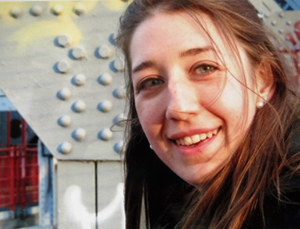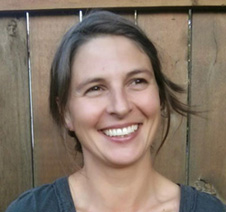An Opaque Surface and an Open Secret: K'ari Fisher in Conversation
with Katherine Magyarody

UVic MFA candidate K'ari Fisher talks with Katherine Magyarody, winner of the 2016 Open Season Award for Fiction with her story, “Goldhawk.” The two discuss the story's secrets, point of view, and unique experiences.
Read what Open Season fiction judge Kathy Page had to say about Magyarody’s winning short story.
Congratulations on winning The Malahat Review’s 2016 Open Season Award for Fiction. When did you start working on “Goldhawk”? Can you tell us about its evolution? For example, did you begin knowing that you were writing a short piece of fiction?
I wrote “Goldhawk” with the knowledge that it would have to be a short piece. In a longer piece, I would have to open it up to a more detailed consideration of Dinara’s history and her motives. That being said, I see this story fitting into a short story collection where we see her and her choices from different perspectives.
Kathy Page, judge for this year's Open Season Awards, wrote of your winning piece: “There are no pyrotechnics or artificial cleverness, and only the barest elements of a plot, but the story makes Dinara, a mystery to her colleagues, completely alive to the reader.” There are many secrets in this story—Dinara’s origins, the bird’s identity, the faceless company. Can you comment on this choice?
I have written Dinara’s past as something between an opaque surface and an open secret. Maintaining bareness of the story has to do with Dinara’s protection of her privacy in ways that reflect both on her personal history and on her place in the company. I’m interested in the different readings people might get from the story.
I like the expression “mandarin class of employees.” in your story. I’ve never heard it before–could you tell me more about it? Where it comes from, and what it means?
In using this phrase, I was referring to a group of employees with a high level of training and intellectual agility. Their innovation has been essential to the identity of the company up to this point, but the restructuring has rendered them obsolete or unnecessary. The use of “mandarin class,” as of “purges” to describe the restructuring of business culture in this North American company might evoke links other, more brutal forms of societal and political restructuring that has occurred elsewhere through history.
Throughout the story, the other employees are viewing Dinara with contempt. It seems to me that this goes beyond co-worker rivalry. What is it about Dinara that makes people view her this way?
Dinara’s coworkers are a little scared of her—and they should be. She has a strength that has allowed her to break into a field that is predominantly male and possesses an almost fraternal culture. I’m always inspired by women who know themselves.
The company where Dinara works hires employees of many different nationalities and, in fact, immigration is strong theme in your story. What part of this experience are you exploring in “Goldhawk”?
All the employees are Canadian, whether they are members of a first-generation cohort like Dinara, or second-, third-, et cetera. Each generation interprets the connection between past and present, here and there differently; for someone who has chosen to come to Canada at some level of personal cost, this allegiance is often keenly felt. At the same time, a cultural background can inflect and enrich one’s understanding of one’s place in the world several generations down the line.
Canada is a very multicultural country and certain industries—like technology—are very successful in hiring across a range of backgrounds. The company’s focus gives the employees very strong points of common interest, because they hire on the basis of talent in a very specific skill set. While they may be diverse in one way (background), they may be homogenous in another (work ethic, age, gender).
What are you currently working on? I believe you are about to complete a PhD in English, is there more fiction on the way?
I am currently working hard on my dissertation and of the short-story cycle of which “Goldhawk” is a part. I am also developing two very different novel manuscripts.
My academic and literary pursuits have really supported each other. I’m interested in how communities evolve, how people form groups and my dissertation and fiction address these questions in different ways. My dissertation looks at nineteenth-century fiction, when authors were really worried about the ways friendships might interfere with or extend certain models of authority. In my fiction I’m trying to craft representations of interactions between different cohorts in diasporic communities, the histories remembered and secrets kept within extended families, the awkwardness of friends meeting each other’s spouses, the roles played by members of friend-groups.
You bring up something I found interesting in your story—the absence of Dinara’s spouse. Dinara is supporting her three children presumably alone. Is there another story in the Goldhawk cycle that illuminates more of her personal history and her motivation to come to Canada?
It’s interesting that you point that out! With Dinara, of course, silences aren’t necessarily absences. I could elaborate more on that side of her story, but I haven’t decided whether I should or whether I want to.

K'ari Fisher
* * * * * * * *









